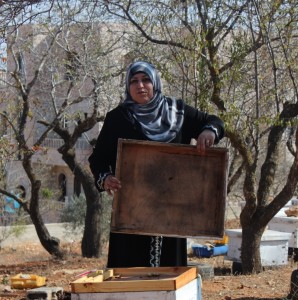Farming lands behind security fence
West Bank food security programme also generates income
Steel security fencing isolates Falamya villagers in West Bank from their farmland. The fence has been erected by Israel.
The villagers say that usually only old men and women can obtain permits to go to the fields.
On a sunny afternoon the gate leading to the fields is closed. On one side are villagers’ houses and vegetable gardens. On the other side of the high fence a man is riding a donkey and waving.
Falamya is one of the villages where the International Orthodox IOCC organisation assists families, who have lost their agricultural land, improve their food security and to generate additional income.
Finn Church Aid and Women’s Bank fund this programme that helps around 180 families set up vegetable gardens, rear sheep, chickens or cultivate beehives.
Jobs are scarce in this rural village in the West Bank and the families are large. Any additional income is welcome.
Own money and sociability
Mothers of five children each Awatef Yousef Waleed Othman and Baselah Khalef live in Falamya village rearing sheep and selling cheese they make from the milk.
“Before the project I did not know anything about livestock and at first sheep were disgusting to me,” Othman says.
“I did not even know how to milk,” she says, adding that nowadays she milks twice every day.
Othman also grows vegetables and dreams of a small greenhouse. She has used the money she has earned to buy animal feed and to pay veterinary expenses, whilst Khalef finances her child’s education.
“My daughter goes to university. I give her every morning around 25 shekels (about 5 euros) from the money that I have earned by selling cheese,” Khalef says, and smiles at her youngest child, 14 -month-old Walid.
Khalef also has beehives. She says beekeeping is important to her socially, as she gets to go out of the home and can talk with other beekeepers.
Children race in egg collecting
White chickens sit on the roof of the hen house and cluck when Sanyra Beni Odi , 37, and her niece, Chania Akram Beni Odi , 12, collect eggs. Egg carton fills up swiftly.
Sanyra lives with her sister Fatinin, 28, and her sister’s child in a village called Kusra, near Nablus city.
Beni Odi’s siblings have received 45 chickens through the IOCC ‘s project and the chickens lay more than 30 eggs daily. The family eats some of the eggs and the rest they sell. They use the money to buy food and other goods.
“Keeping chicken benefits us economically. Sometimes I buy clothes for my child”, Fatin says.
The siblings are satisfied with their hen house and plan for more chickens or other livestock.
“Keeping chickens is not difficult. For the children picking eggs is a game,” says Sanyra, surrounded by a dozen children.
On the other side of the village are the beehives Neidee Hassan, 50, takes care of. Hassan is a childless widow. She lives with her sister, who has seven children.
“I help my sister,” she says.

Neidee Hassan takes care of beehives in Qusra village in West Bank. She earns $25 for each kilo of honey sold.
This year her five beehives produced about six kilos of honey, a few kilos less than in the previous two years. But honey revenue is important to Hassan.
“One kilo of honey costs about $25,” she says.
Hassan hopes that the program could assist more women. She also dreams of attending sewing and computer classes.
Text and photo: Terhi Kinnunen